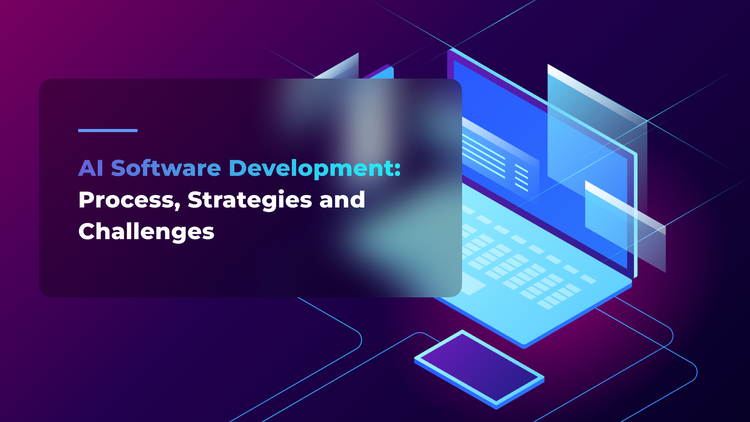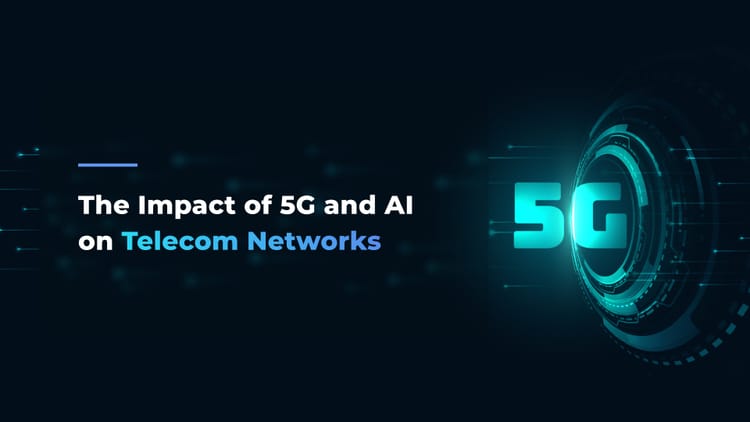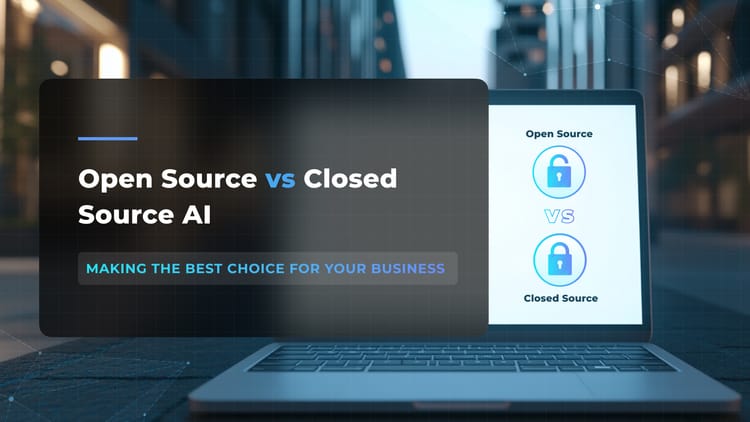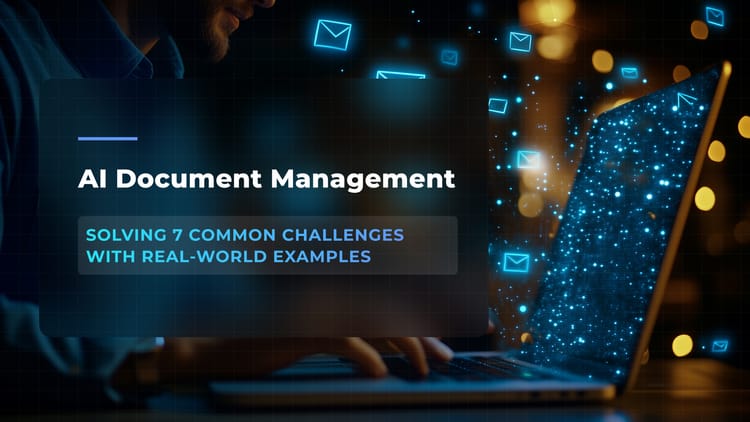AI Implementation Strategies: Building, Customizing, or Integrating?
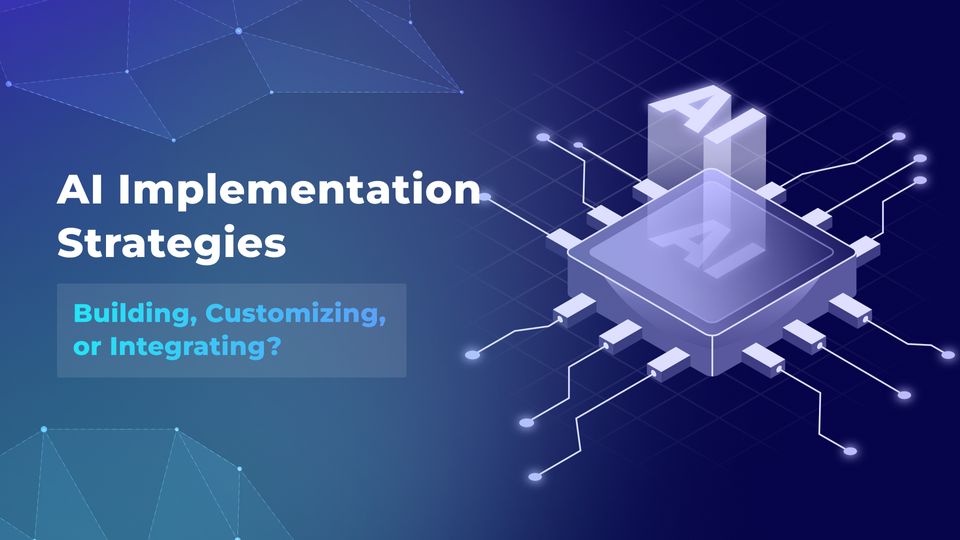
“Building an AI solution from the ground up is the only way to secure a competitive advantage”, some business owners argue, and they couldn't be more wrong.
Unlike just a few years ago, there is now a plethora of off-the-shelf artificial intelligence options designed for specific domains. What's more, this selection continues to grow as the global adoption rate of AI continues to rise, currently being at 35%. But while the idea of building a custom AI solution is appealing, it also can be resource-intensive and, in many cases, is optional rather than necessary.
At Flyaps, we focus mainly on building and implementing AI solutions. Thanks to our track record of successful cases, we’ve got enough firsthand experience to help you learn everything there’s to know about AI implementation strategies. Further on, we will unveil three main AI implementation strategies: building, customizing and integrating through gen AI tools. We will explore pros and cons of each approach and discuss some real-life examples of such solutions. Sounds interesting? Then, keep reading.
Custom artificial intelligence implementation
A critical component of building custom AI solutions is establishing robust data pipelines to ensure efficient data flow and processing.
Take a telecom company managing a vast network across rugged, remote regions. Standard solutions can’t handle the unique challenges posed by these terrains. To meet their connectivity needs, they need to develop a tailored AI system.
The company must assemble a team of top-tier AI and data experts, who will collaborate with their industry specialists. Together, they design a system that adapts in real-time, ensuring seamless signal transmission even in the harshest conditions.
With that being said, let's explore the advantages and disadvantages of custom AI implementation.
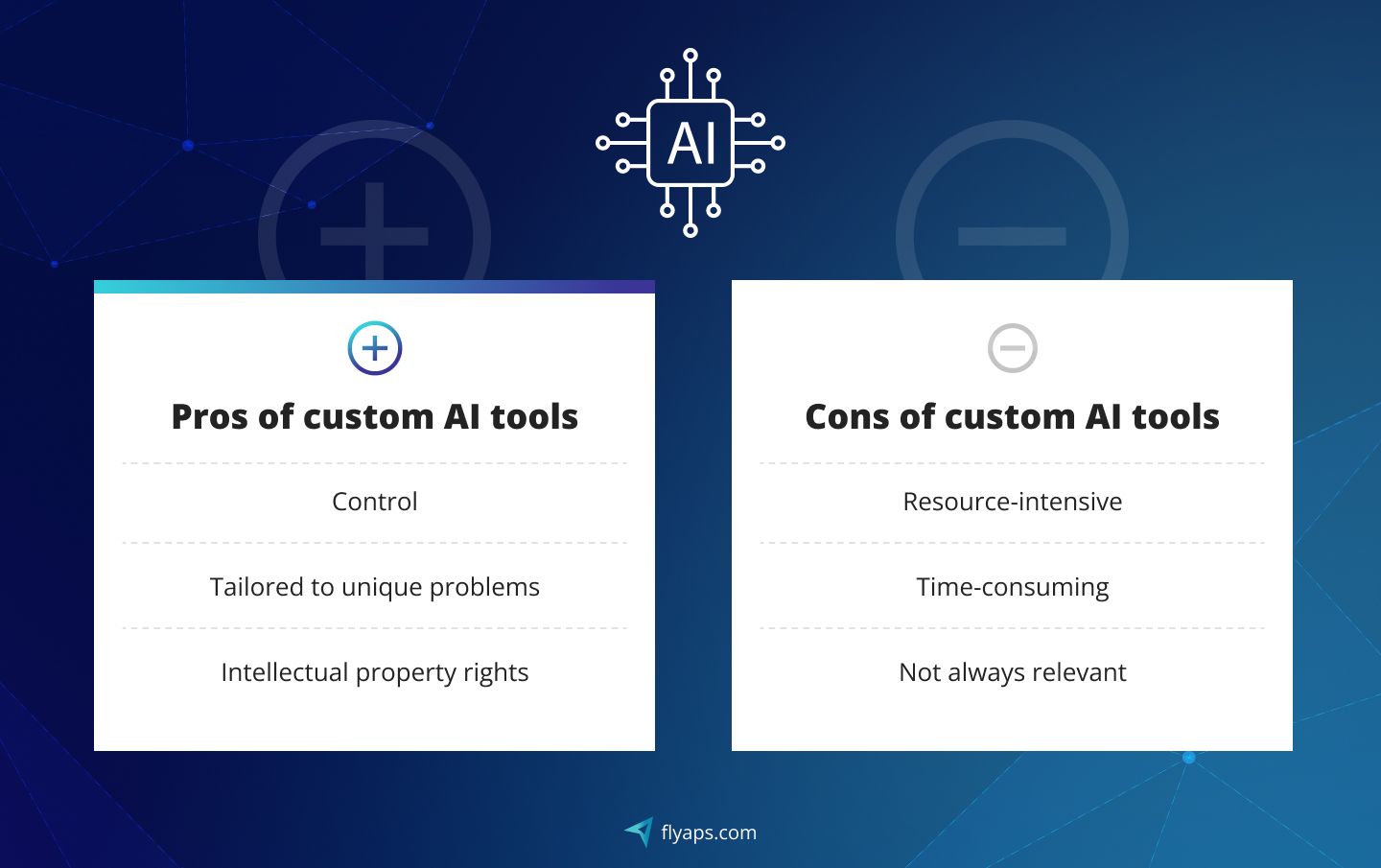
Pros of custom AI implementation in business
1. Control
Custom artificial intelligence solutions give organizations full control over development, ensuring tools meet specific business objectives and needs.
2. Tailored to unique problems
Custom-built artificial intelligence technologies address complex challenges that off-the-shelf solutions can’t resolve, providing a significant competitive advantage.
3. Intellectual property rights
Owning the technology ensures exclusive access to its benefits, increasing business value and enhancing customer satisfaction.
Cons of building custom AI tools
1. Resource-intensive
Developing custom solutions requires skilled data scientists, advanced infrastructure, and significant investment, which can strain resources — here’s a detailed breakdown of what goes into the cost of building AI in 2025.
2. Time-consuming
The process of building a custom AI solution, from research and data preparation to coding and testing, can take a lot of time and may not yield meaningful results quickly.
3. Not always relevant
Some businesses can achieve their AI-related goals by leveraging existing technologies, partnerships, or ready-made solutions, making the custom build option unnecessary.
So, let’s sum up what businesses usually benefit from this AI implementation strategy.
Check out our skills and book a call to kick off your AI journey.
Learn moreCompanies that are best suited for this approach
Companies with highly specific needs (like telecom providers tackling complex connectivity challenges) are prime candidates for custom-built artificial intelligence solutions.
This AI implementation strategy also works well for businesses developing cutting-edge business intelligence products that rely on advanced AI capabilities.
For smaller organizations or those operating on tight budgets or timelines, buying pre-built AI tools, leveraging AI development platforms or collaborating with external experts can often be the smarter choice. The decision to build, buy, or partner ultimately depends on the company’s goals, resources, and priorities.
Example of implementing AI in business: building an ML-based resume parsing app for HR technology company
Relocate.me, a platform that connects IT professionals with job opportunities around the world, encountered a common problem – candidates were often rejected without an interview due to subpar resumes. As the platform's user base grew, manually improving resumes became increasingly time-consuming. The team recognized the need for an automated solution to efficiently improve technical resumes.
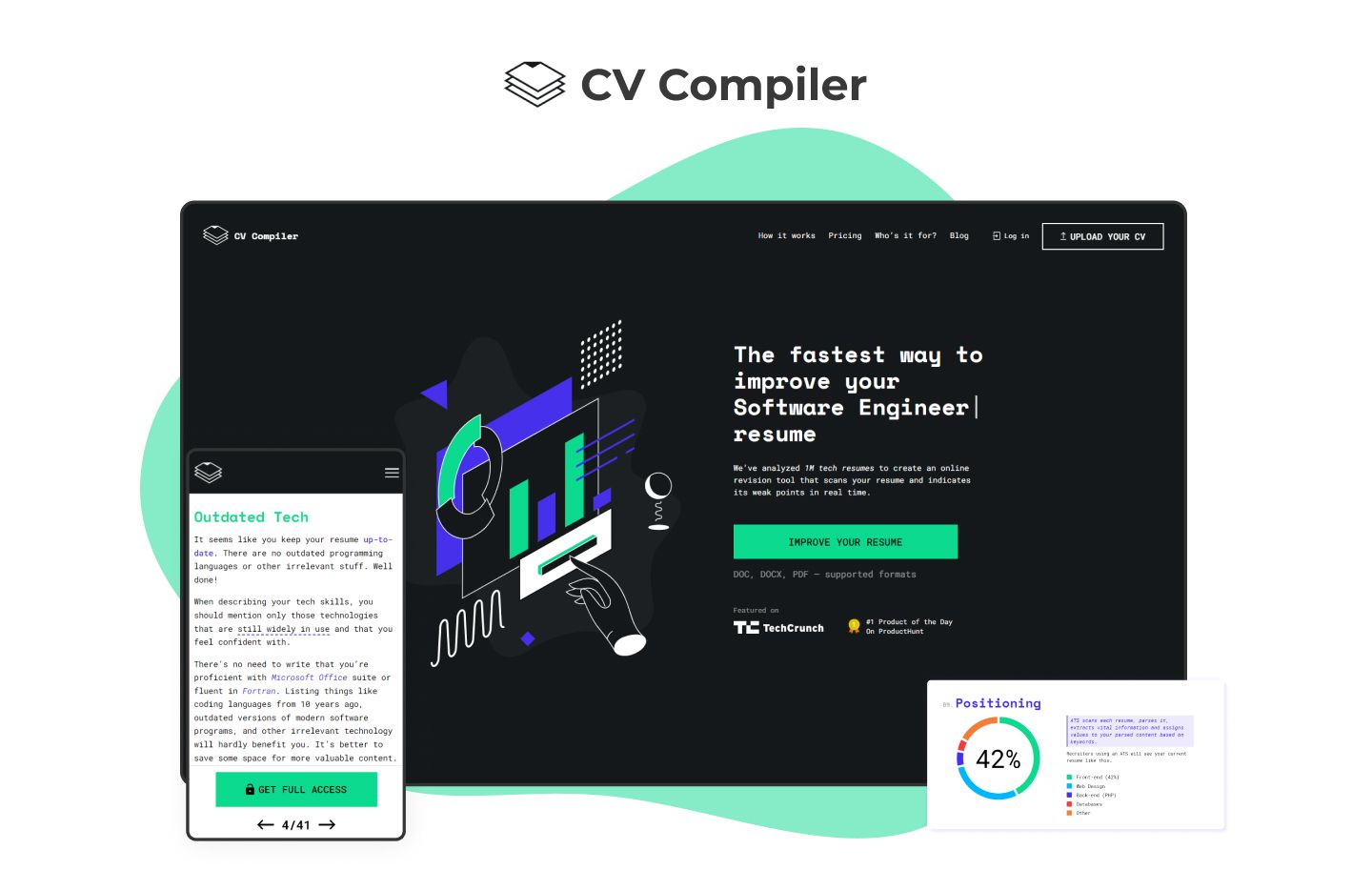
Relocate.me designed CV Compiler, an AI-powered tool that analyzes and improves tech resumes based on CV guidelines and a technical glossary. To develop a machine learning algorithm capable of analyzing resumes, the company turned to Flyaps for help.
The tool works in the following manner: CV Compiler effectively parses resumes, evaluates their content, and provides customized recommendations for improvement. Users receive unique advice on how to improve their resumes and increase their visibility to recruiters at top companies.
To achieve this remarkable result, Flyaps began by addressing the PDF analysis challenge. The primary format for resumes is PDF, which accounts for 80% of the resumes analyzed by CV Compiler. Analyzing PDFs presents difficulties due to encoding and formatting variations. Our team overcame this bottleneck with specialized libraries and used machine learning techniques such as NLP for accurate text extraction.
Flyaps also integrated a machine learning model with the CV Compiler to improve the accuracy of section identification. This integration achieved an impressive response time of 1.87 seconds, with potential for further improvement.
The development of the API for CV Compiler was a significant milestone, enabling the introduction of an API as a service business model. The product was optimized for CV Compiler customers, including Indeed, a global online job search platform. CV Compiler's flexible API adapts to specific business needs, allowing the extraction of custom features such as resume summaries.
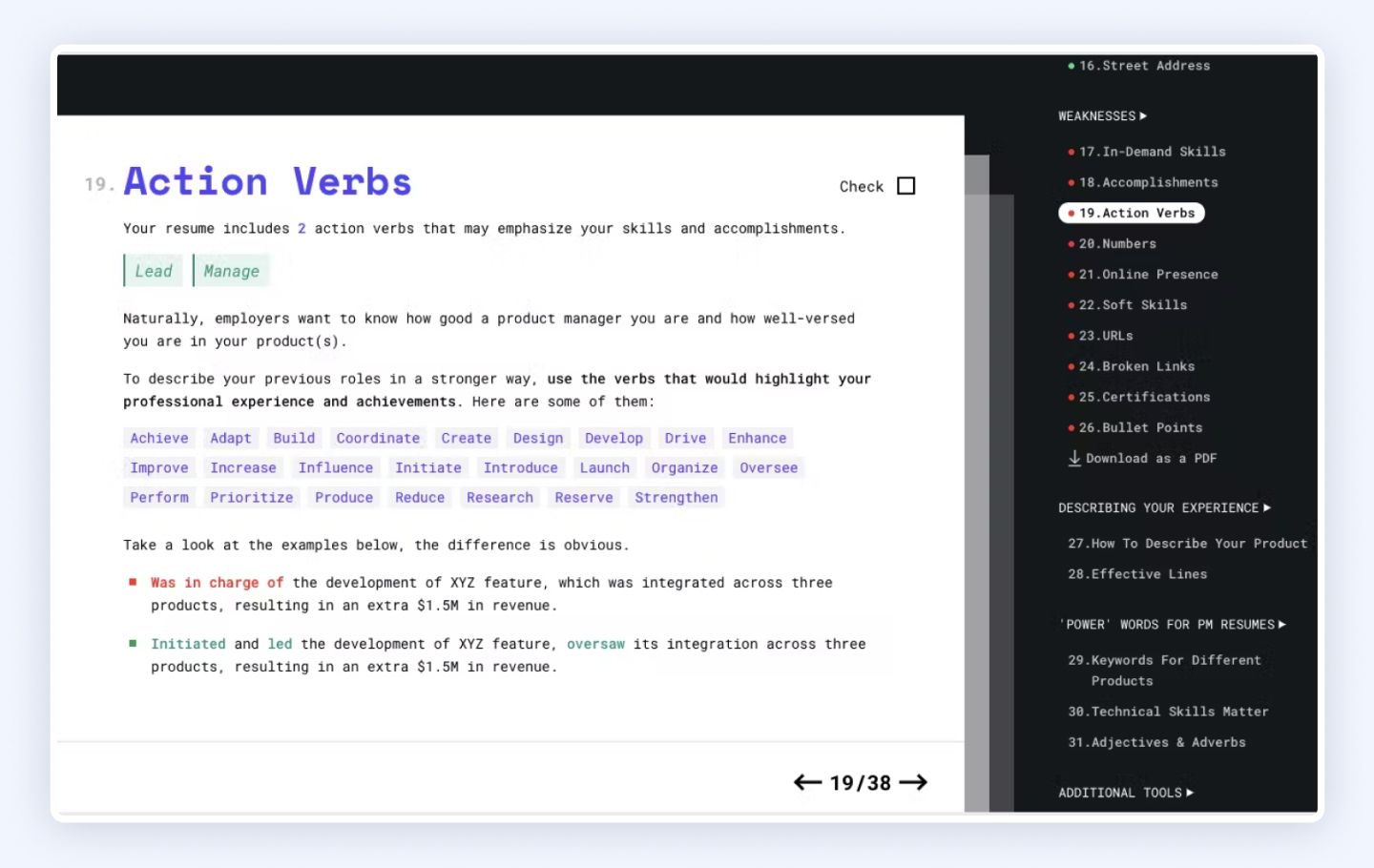
As a result, CV Compiler has become a go-to tool for both businesses and individuals, drawing in boot camps and over 50,000 IT professionals. Boot camps use it to equip students with a powerful resource that boosts their chances of landing jobs.
What started as an internal solution has grown into a potential revenue stream, with other companies now using it to tackle similar challenges.
How to implement AI by customizing off-the-shelf solutions
Apple’s approach to the iPhone illustrates a valuable strategy: focus on core strengths while leveraging external expertise. Apple designs and markets the iPhone but collaborates with specialized manufacturers for components like cameras and displays.
A similar method applies to implementing artificial intelligence in business, particularly in machine learning. Rather than building solutions from scratch, companies can adopt pre-built AI tools or AI solutions and customize them to align with specific business objectives. This strategy, known as AI as a Service (AIaaS), offers tools through websites or software, making AI integration more accessible.
For instance, Microsoft Power BI provides AI-based solutions for data visualization and data preparation. With features like AI Insights, pre-trained machine learning models improve data collection and analysis. Its open-source Power BI Visuals SDK allows businesses to customize the tool, ensuring smooth integration into business operations.
AI-based browser extensions represent another AI system category that can seamlessly integrate into a company's daily operations. Consider the case of Grammarly, a widely recognized AI-powered tool.
Initially a personal writing assistant, Grammarly has been tailored by businesses to match industry-specific terminologies, communication standards, and branding. This customization enhances customer satisfaction by aligning the tool with unique company needs, ensuring it supports tone, style, and overall business processes.
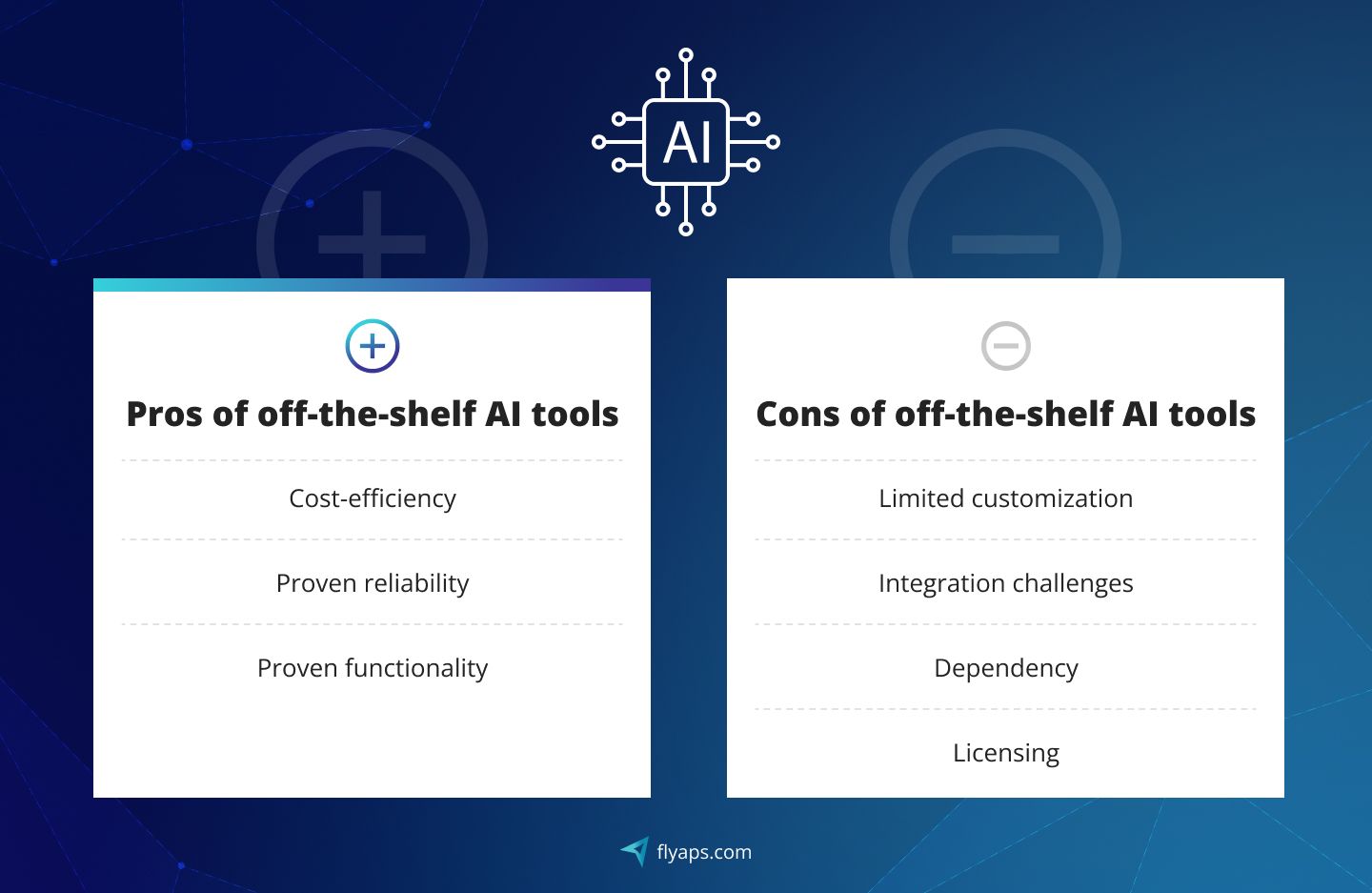
Pros of customizing off-the-shelf AI solutions
1. Cost-efficiency
Customizing existing AI solutions is more cost-effective compared to building one from scratch. It saves you time and resources that would otherwise get spent on developing a solution from scratch.
2. Proven reliability
Established AI solutions have a proven track record, ensuring a high level of reliability and trustworthiness.
3. Proven functionality
Off-the-shelf gen AI models and AI applications have been rigorously tested, offering assurance that their core features and functionalities work as intended.
Cons of customizing off-the-shelf AI solutions
1. Limited customization
Customization is often limited by the features and capabilities of the solution of your choice.
2. Integration challenges
Integrating off-the-shelf AI solutions with existing systems and processes within an organization may pose challenges, particularly when dealing with legacy systems.
3. Dependency
Companies may need more control over the core functionality and development roadmap than when building their own AI product. Businesses can also become dependent on their provider, which could pose a risk if the provider experiences issues.
4. Licensing
While off-the-shelf solutions can be cost-effective initially, licensing fees and additional customization costs can accumulate over time, potentially making it less cost-effective in the long run.
Companies that are best suited for this approach
For businesses with constrained budgets and resources, customizing existing AI solutions is a pragmatic choice. It allows them to tap into AI benefits without the significant upfront costs and resource investments associated with building AI from scratch.
Companies that require specialized AI components or access to particular datasets often find this AI implementation strategy to be a convenient starting point. These solutions can be tailored to incorporate the required components, saving the company its time and budget.
In essence, the versatility and cost-effectiveness of customizing off-the-shelf AI solutions make this approach particularly well-suited to organizations that need a rapid and scalable solution for incorporating AI into their operations.
Example of implementing AI in business: an AI-based plugin for IT recruitment that allows companies to streamline hiring processes
GlossaryTech, an HR technology startup, approached Flyaps with a specific need: to develop an AI-based Chrome extension that streamlines the evaluation of candidates' IT expertise for IT recruiters. The client wanted to create a tool that would significantly simplify the resume screening process by automatically analyzing and scoring candidate resumes.
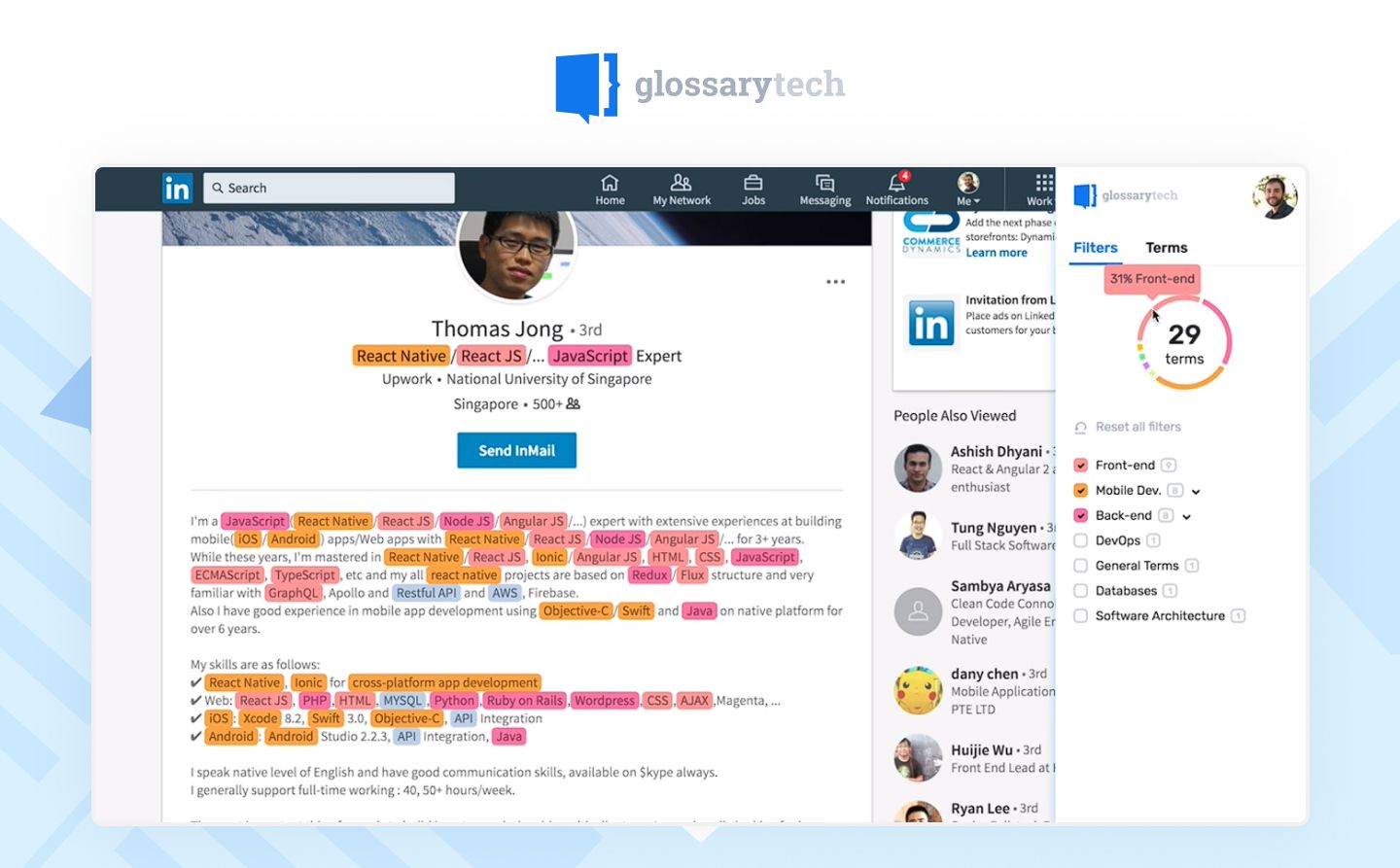
To solve this problem, Flyaps had to develop a solution that could understand human language data and accurately recognize technical terms, including multi-word expressions such as "Ruby on Rails" or "React Native". Our team chose to implement a natural language processing algorithm using the NLTK Python library and create a custom tokenizer to achieve fast and accurate text analysis.
The main challenge was to develop an algorithm that could extract and accurately interpret essential data from unstructured documents. This was particularly complex when dealing with technical terms and jargon. To overcome these challenges, Flyaps developed an NLP algorithm that referenced a technical glossary to understand the context and meaning of the language.
In addition, Flyaps developed a custom tokenizer optimized for identifying specific entities or phrases in the ICT domain, including multi-word expressions. Building this tokenizer allowed for greater control over text preprocessing, resulting in a more consistent and higher-quality analysis tool.

As a result, the extension has gained popularity with over 25,000 users, including major industry players such as Tesla, Microsoft, and Amazon.
Generative AI implementation strategy
The third approach to AI implementation is to use existing generative AI tools, such as ChatGPT or GitHub Copilot, an AI-powered code assistant, to seamlessly integrate AI capabilities into an organization's workflow.
Consider a software development company that specializes in building mobile apps for various domains. To improve their app development process, they decided to integrate GitHub Copilot to help their developers write code more efficiently and with fewer errors. The tool provides real-time code suggestions, automatically fixes common coding errors, and even offers solutions to complex programming challenges.
Although this AI tool doesn’t cover every aspect of the company’s workflow, it has boosted its competitiveness. By adding artificial intelligence features to the tools employees already use, productivity and code quality have improved — without the need for a major development effort.
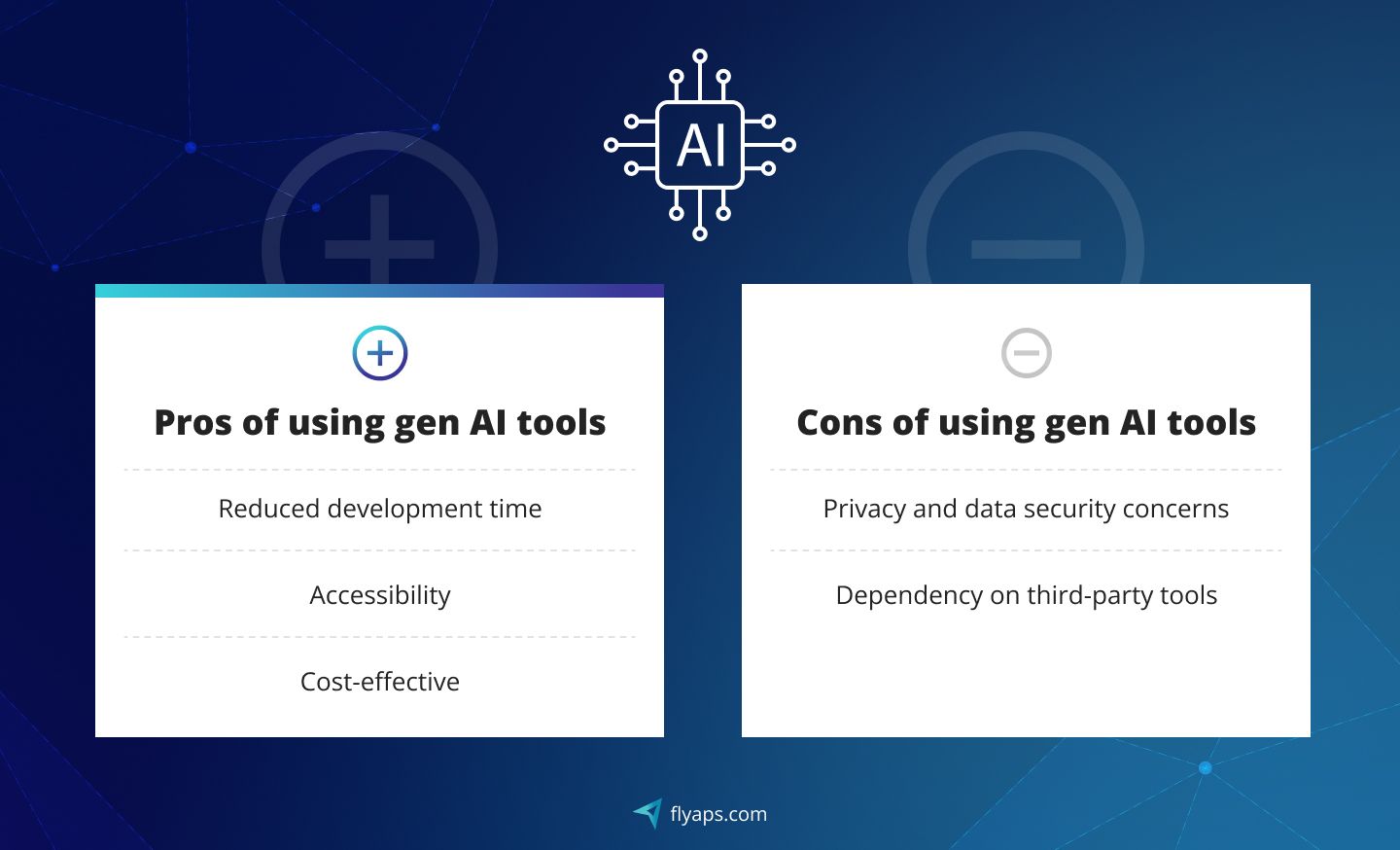
Pros of relying on gen AI tools
1. Reduced development time
By streamlining the coding process and offering solutions for complex programming challenges, AI tools can speed up the development cycle, allowing companies to deliver products faster.
2. Accessibility
AI tools like GitHub Copilot are readily available and accessible, making it easier for organizations to incorporate AI capabilities into their workflows without requiring specialized expertise.
3. Cost-effective
Using existing generative AI tools is often more cost-effective than building custom AI solutions from scratch, as it eliminates the need for extensive development efforts and associated expenses.
Cons of relying on gen AI tools
1. Privacy and data security concerns
Integrating external AI tools may involve sharing sensitive company data, raising concerns about data security and privacy.
2. Dependency on third-party tools
Relying on external AI tools means the organization becomes dependent on the availability and updates of those tools, which could lead to disruptions in workflow if the tools are modified or discontinued.
Companies that are best suited for AI implementation via gen AI tools
Organizations that specialize in software development, like the mobile app development company mentioned in the example, can benefit from generative AI tools like GitHub Copilot to streamline their coding process and increase productivity.
Startups with limited resources can also use generative AI tools to accelerate product development process and reduce costs, allowing them to compete more effectively.
Small and medium-sized businesses (SMBs) that often face time and budget constraints can also use generative AI tools to streamline their workflows.
Example of implementing AI in business: how Panasonic Connect partnered with Microsoft and used the Azure OpenAI Service to create ConnectAI
Panasonic Connect, a division of the Panasonic Group, has partnered with Microsoft to leverage the power of the Azure OpenAI Service to bring ConnectAI to its 12,500 employees in Japan.
The decision to integrate AI into its daily operations stemmed from the belief that AI will become an indispensable tool for all business professionals. The primary goal was to empower employees to focus on creative and complex tasks, while delegating repetitive and time-consuming work to AI.
The foundation of ConnectAI, the Azure OpenAI Service, provided advanced language models such as OpenAI GPT-4, GPT-3, Codex, DALL-E, and Whisper. With these capabilities, ConnectAI was able to assist employees with a wide range of tasks, from drafting emails to coding, significantly increasing overall productivity.
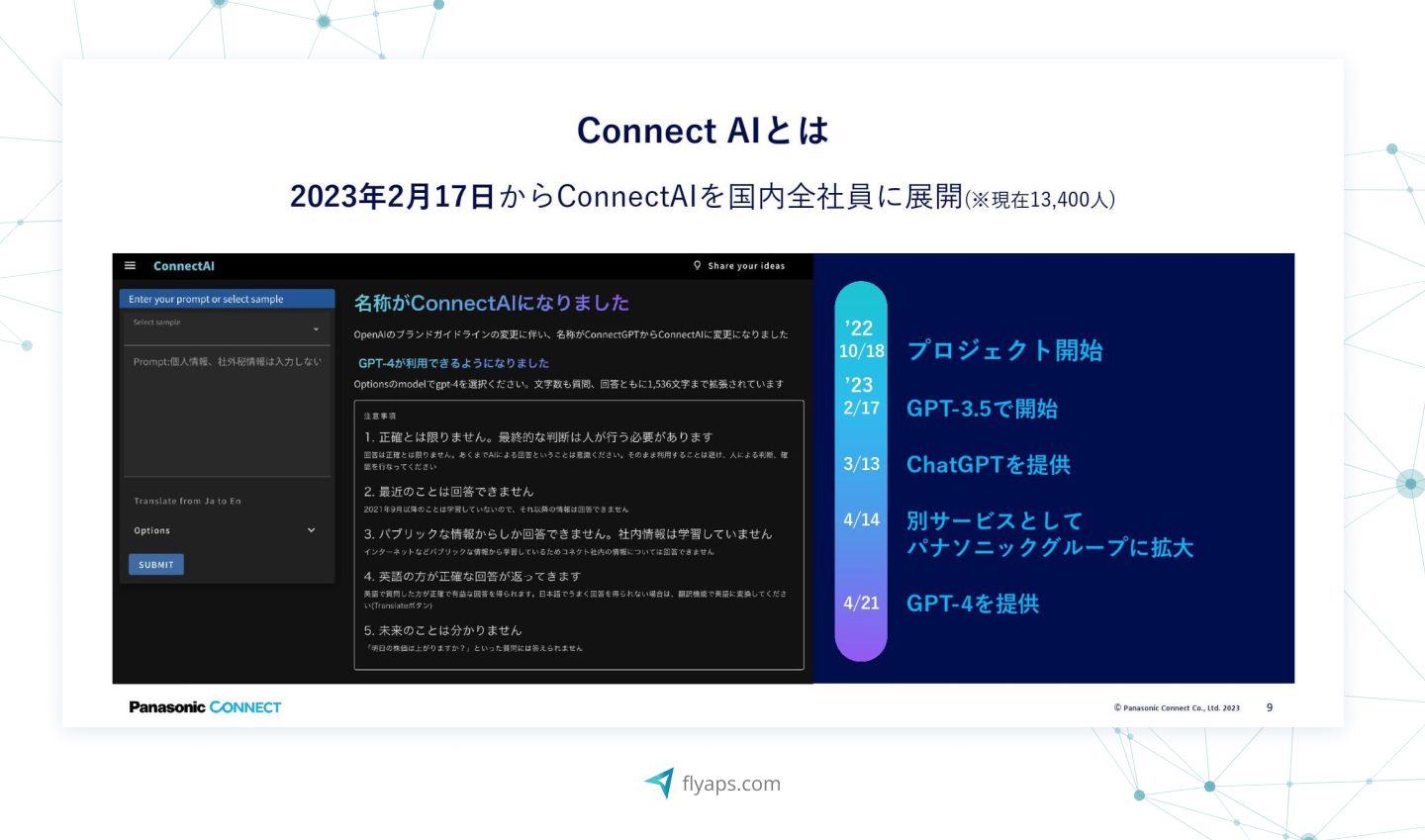
ConnectAI was carefully designed to be easy to use and require minimal training. Users accessed the assistant through a simple URL and were able to ask questions in a way that they were used to rather than using traditional search terms.
In addition, Azure OpenAI Service introduced additional features that included responsible AI safeguards and content filtering to improve the overall experience.
After its rollout in February 2023, ConnectAI experienced rapid growth in user queries. The number of questions increased from 55,380 in the first month overall to 5,000 questions per day. The user base spanned various departments, from IT to legal and accounting, boosting the company’s overall performance.
How Flyaps can support your AI integration
As an AI-focused software development company, Flyaps offers comprehensive support for businesses in integrating cutting-edge AI technologies into their operations. Here’s what we can offer you.
Custom AI development
Flyaps can design and develop custom AI solutions that align with your business requirements. This might involve creating AI algorithms, machine learning models, or AI-driven applications.
Data management
Effective AI integration requires high-quality data. We can assist you in data collection, cleaning, and storage to ensure the availability of accurate data for AI applications.
Integration with existing systems
We can integrate AI solutions seamlessly into your current software and technology infrastructure. This might involve developing APIs or connectors to link AI components with existing applications.
Unsure about the most suitable AI implementation strategy for your business? Don't hesitate to reach out, and we'll gladly assist you in finding the right path!
Check out our capabilities and let’s find the right approach together.
Learn more

